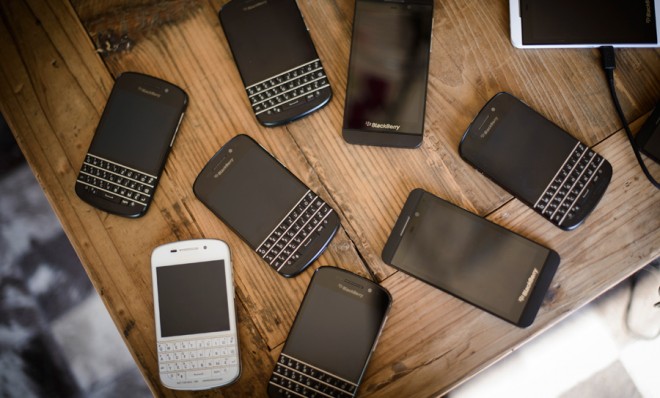Out of its misery: BlackBerry is going private
The former king of the smartphone game is a shadow of its former self


A free daily email with the biggest news stories of the day – and the best features from TheWeek.com
You are now subscribed
Your newsletter sign-up was successful
BlackBerry said on Monday that it had reached a tentative $4.7 billion deal to take the company private.
Fairfax Financial Holdings, already one of the company's biggest shareholders, floated the offer to buy the struggling smartphone manufacturer for $9 per share. BlackBerry, which entered into the agreement following the recommendation of a special committee of its board members, has six weeks to shop around for a better offer.
"The special committee is seeking the best available outcome for the company's constituents, including for shareholders," Barbara Stymiest, BlackBerry’s chairwoman, said in a statement.
The Week
Escape your echo chamber. Get the facts behind the news, plus analysis from multiple perspectives.

Sign up for The Week's Free Newsletters
From our morning news briefing to a weekly Good News Newsletter, get the best of The Week delivered directly to your inbox.
From our morning news briefing to a weekly Good News Newsletter, get the best of The Week delivered directly to your inbox.
The deal would cap a stunning collapse for BlackBerry, which once ruled the smartphone market. Yet increased competition and a failure to keep pace precipitated a near-complete implosion in a few short years, a testament to how rapidly fortunes can change in the tech industry.
In 2009, BlackBerry held nearly 50 percent of the U.S. smartphone operating systems market. That figure has since plummeted to a meager 2.1 percent, according to market research firm IDC.
At its peak in June 2008, BlackBerry shares went for just shy of $150 apiece. They now go for eight dollars and change. BlackBerry shares opened at $8.22 on Monday before rising slightly with the news of the potential buyout deal. Here's the ugly trajectory:
The proposed $9-per-share buyout would equal just six percent of the stock's peak value.
A free daily email with the biggest news stories of the day – and the best features from TheWeek.com
Meanwhile, Apple and Android devices have steadily turned the smartphone game into a two-way competition.
As of July, Apple dominated almost 40 percent of the U.S. smartphone market, according to comScore.
At the same time, Android has completely taken over the market for global smartphone operating systems. In November 2011, Android held 52.5 percent of that market; it now controls almost 80 percent, followed by Apple's iOS at 13.2 percent.
BlackBerry thought it had a turnaround in sight when it released the BlackBerry 10 operating system in January. However, that platform proved to be a monumental flop with consumers, sending the company even further into decline.
On Friday, Blackberry announced it would lay off up to 40 percent of its workforce and report a $1 billion quarterly loss — much of it coming from writing down unsold BlackBerry 10 phones. The same day, the company's share price fell 17 percent.
BlackBerry has said it will give up on the consumer market, instead focusing on corporate services. But even there, it's uncertain if BlackBerry can offer a competitive product to keep itself afloat now that Apple and Android have begun to eye that niche as well.
"We see no hope for BlackBerry at this point," one analyst, Brian Colello, warned in the wake of Friday's news, according to Reuters. The company, he added, was caught in a "a death spiral."
That was before BlackBerry announced it would try to go private, a move which itself has the potential to worsen its problem.
Here's the New York Times' David Gelles and Ian Austen:
While being privately held would allow BlackBerry to restructure without worrying about bad news affecting its share price, several analysts have questioned how it can remain in the phone business without access to open capital markets. Its competitors like Apple and Google are among the most profitable and largest corporations in the world. [New York Times]
Or as New York's Kevin Roose put it, the proposed buyout amounts to "a mercy killing."
Jon Terbush is an associate editor at TheWeek.com covering politics, sports, and other things he finds interesting. He has previously written for Talking Points Memo, Raw Story, and Business Insider.
-
 Crisis in Cuba: a ‘golden opportunity’ for Washington?
Crisis in Cuba: a ‘golden opportunity’ for Washington?Talking Point The Trump administration is applying the pressure, and with Latin America swinging to the right, Havana is becoming more ‘politically isolated’
-
 5 thoroughly redacted cartoons about Pam Bondi protecting predators
5 thoroughly redacted cartoons about Pam Bondi protecting predatorsCartoons Artists take on the real victim, types of protection, and more
-
 Palestine Action and the trouble with defining terrorism
Palestine Action and the trouble with defining terrorismIn the Spotlight The issues with proscribing the group ‘became apparent as soon as the police began putting it into practice’
